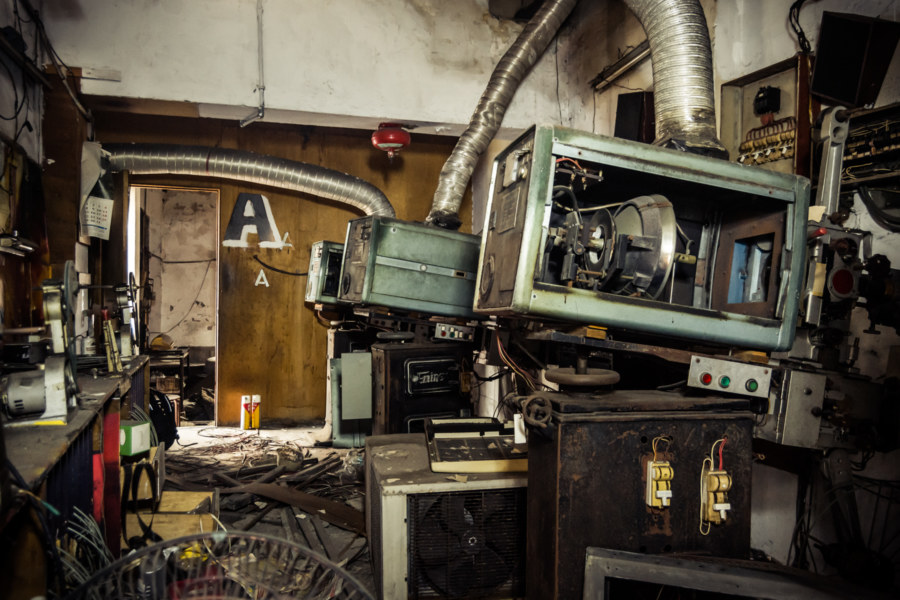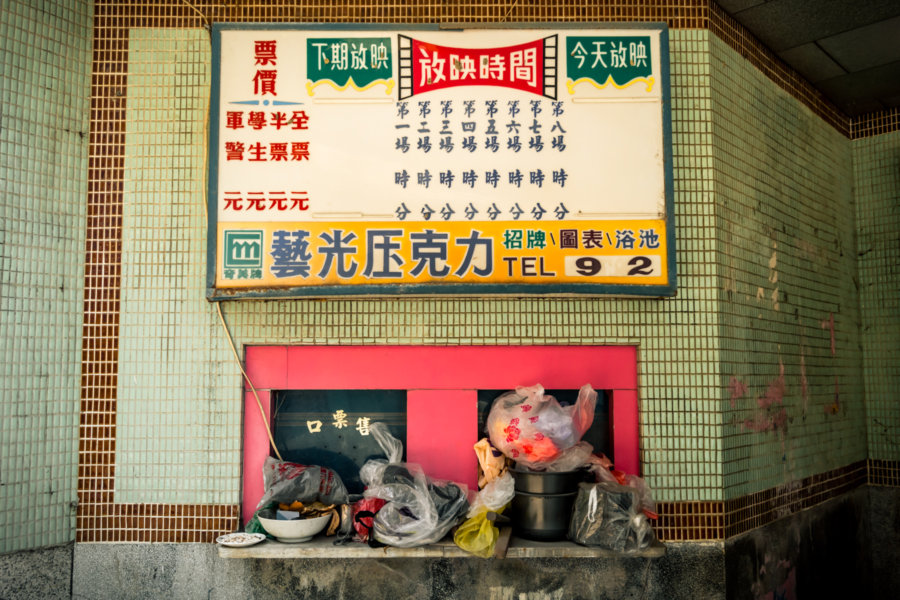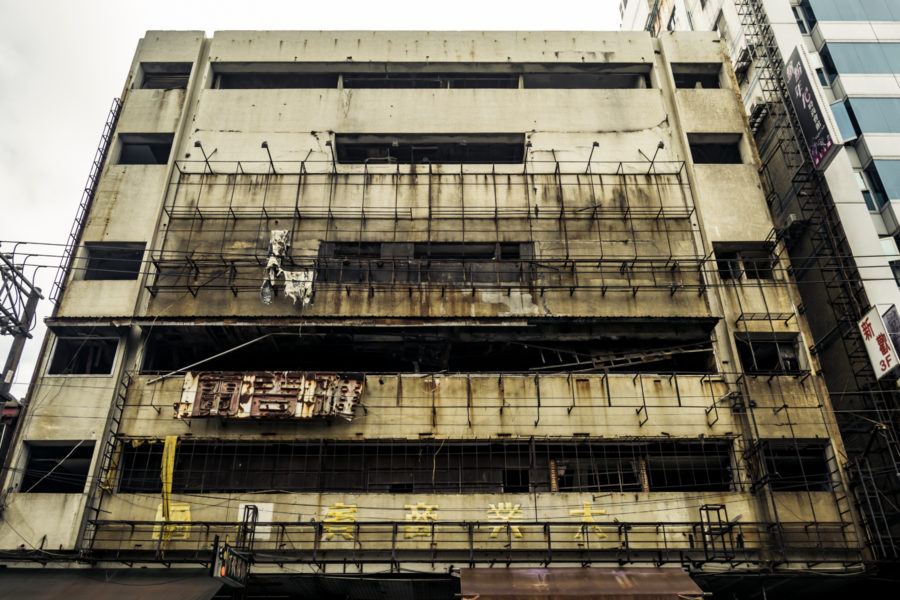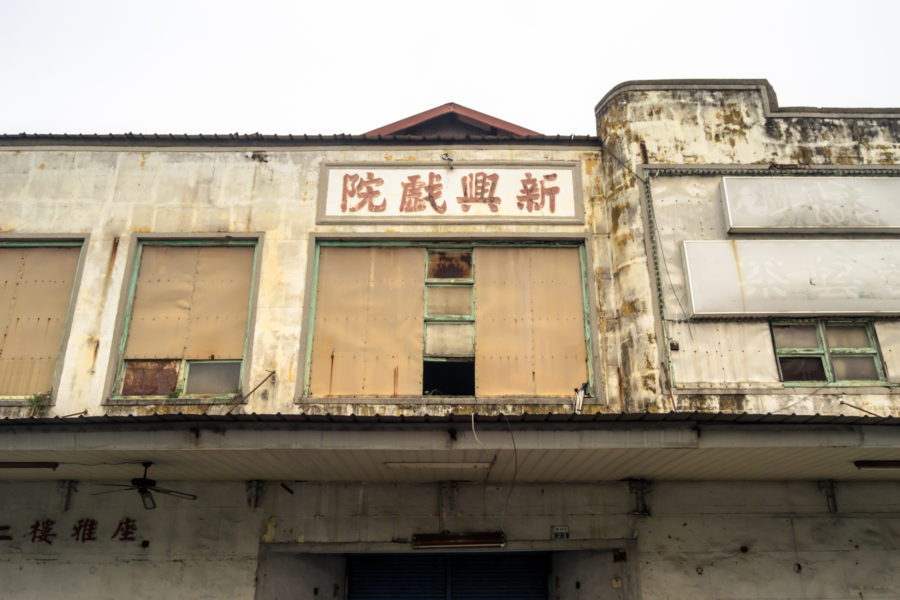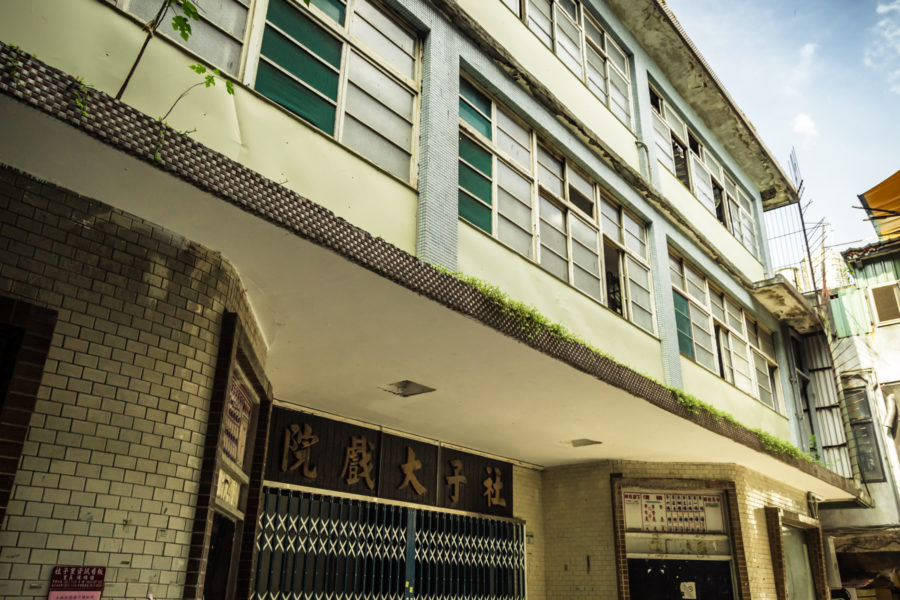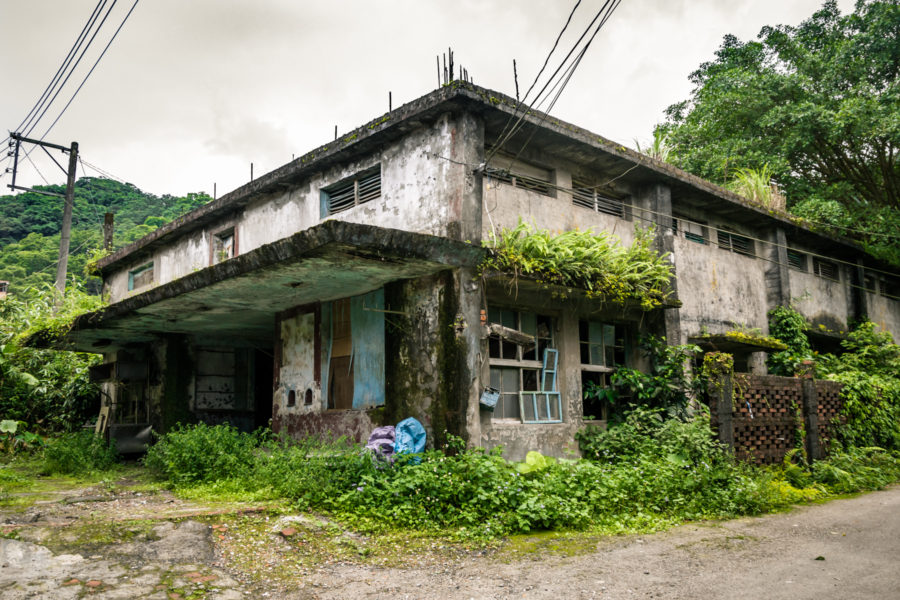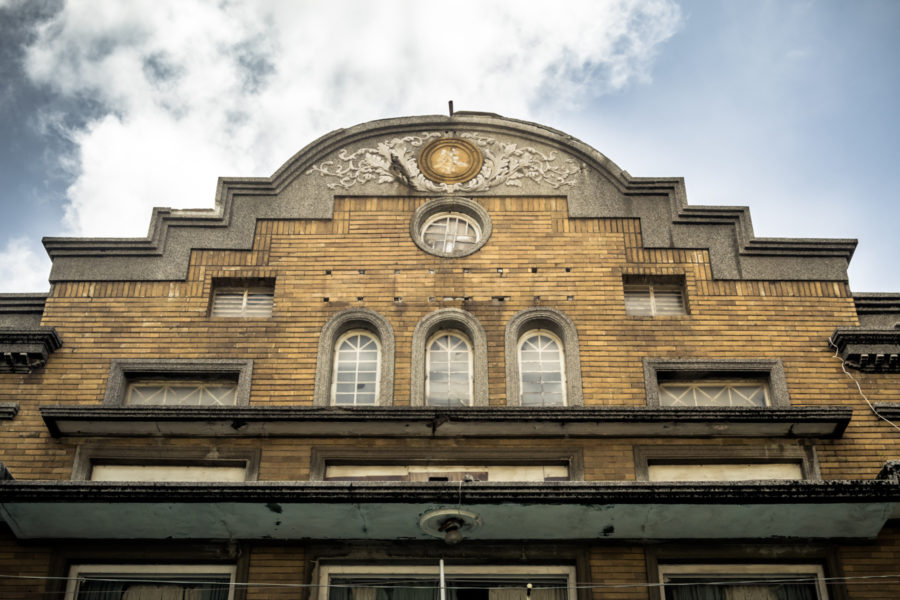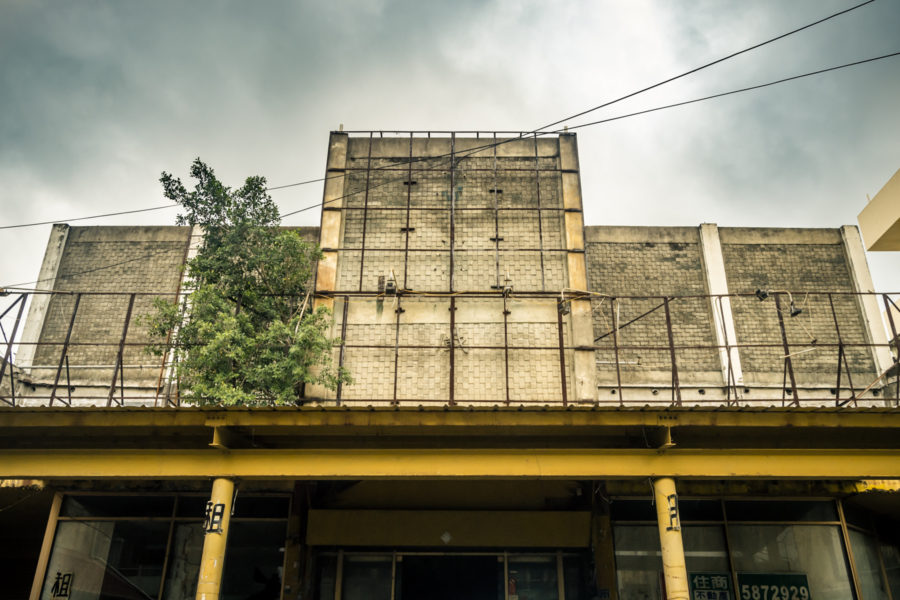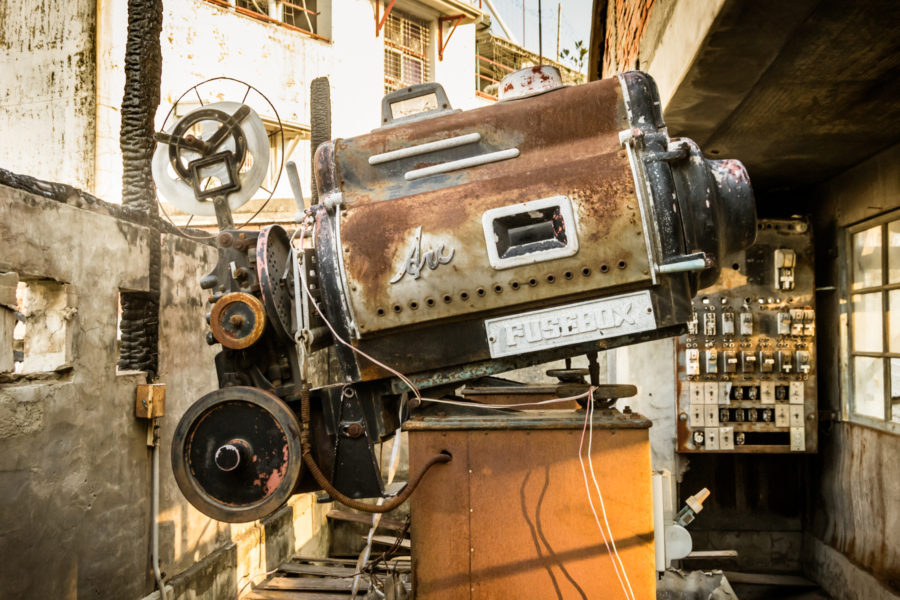Zhongli is home to a surprising number of disused and abandoned cinemas, relics of a lost age of theater in this conurbation of half a million sprawling across the central Taoyuan Plateau 桃園台地. Decades ago there were nearly two dozen standalone movie theaters in town—but only Zhongyuan Theater 中源大戲院, one of two in Taiwan still displaying hand-painted movie posters, clings to life as of 2018. Most of the others have been renovated beyond recognition or demolished, but several more are derelict, hard-worn subjects of entropy. Among these relics there are none more alluring than the imposing Dàdōng Theater 大東戲院 (literally the “Great Eastern Theater”), former anchor of Zhongli’s long-vanished Cinema Street 戲院街.
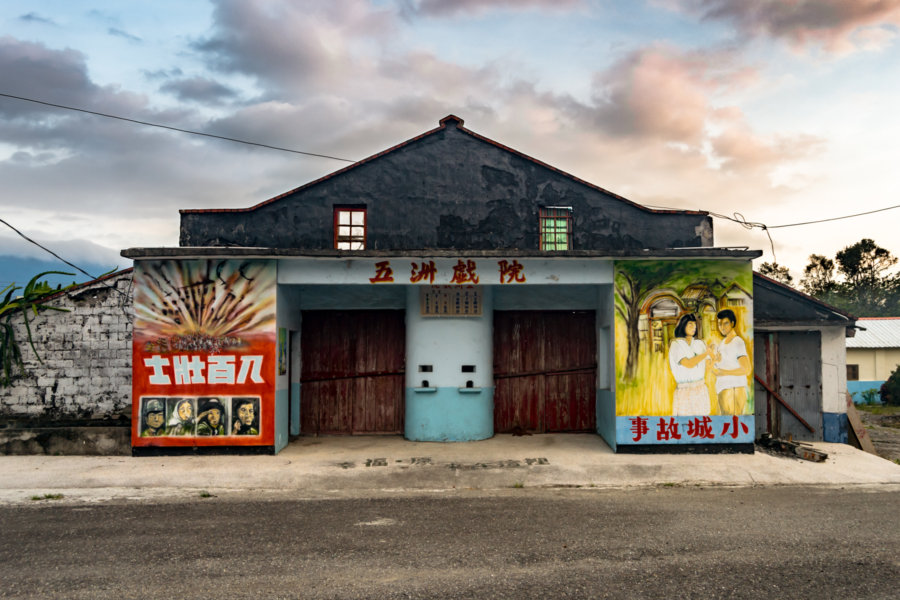
Abandoned theaters have become one of my main urbex projects in Taiwan. The industry collapsed almost overnight at the turn of the millennium and the urban landscapes of the island are still littered with the husks of these former centers of entertainment. Let the show begin!
Adjacent Terms
Chishang Wuzhou Theater 池上五洲戲院
Wǔzhōu Theater (五洲戲院) is the last remnant of cinema in Chishang, Taitung, a picturesque town located in the fertile Huadong Valley of Taiwan. Built in 1965 in the midst of the Taiwan Economic Miracle, it remained in business until 1982. After the final screening the theater was neglected for decades, falling into disrepair but remaining more or less intact until recently. More recently Chishang emerged as a tourist destination, prompting a local community development association to invest in revitalizing the theater in 2013.
Xiluo Yuandong Theater 西螺遠東戲院
Xiluo is a small historic town in rural Yunlin, Taiwan. Despite its diminutive size Xiluo was once home to three standalone movie theaters: the eponymous Xiluo Theater (西螺戲院), Yisheng Theater (一生戲院), and Yuǎndōng Theater (遠東戲院, literally “Far East Theater”), the subject of this brief report. Previously I misidentified Yisheng Theater as Yuandong, something I only learned after visiting a photo exhibition at Huashan 1914 Creative Park in 2017. After realizing my mistake I went to some lengths to locate and later visit this theater—which, in hindsight, I’ve passed on several occasions without noticing it down a small side street of the same name.
Guobin Commercial Building 國賓商業大樓
Guóbīn Commercial Building 國賓商業大樓 is an ugly ruin in the heart of Zhongli, a city of around half a million people in Taoyuan, Taiwan. Built at the dawn of the booming 1980s, it was home to a variety of entertainment businesses over the years, and appears to have been mostly abandoned sometime around the turn of the millennium. Much to my surprise I’ve not found much about this place online, which suggests whatever newsworthy calamities befell this derelict commercial building predate the era of digital journalism. Without any sources to draw upon I can only make some educated guesses about what I captured during a brief visit in the early days of 2017.
Dalin Xinxing Theater 大林新興戲院
What remains of Xīnxīng Theater 新興戲院 can be found just east of the train station in Dalin, a modest town of approximately 30,000 just north of Chiayi City in Taiwan. Despite its relatively small size Dalin once supported five movie theaters, providing entertainment for sugar factory workers and the many soldiers stationed at nearby military bases. Xinxing Theater (not to be confused with the one in Xinpu) originally opened as Rénshān Theater 仁山戲院 in 1954 and remained in business until 1992. Eventually the theater was renovated and subdivided into a billiards hall and KTV (also known as a karaoke box) before it was finally abandoned sometime around 2013. Recently there was talk of buying the property and transforming it into a creative market but its ultimate fate remained unknown until it was finally demolished in 2019.
Shezi Theater 社子大戲院
Shèzi Theater 社子大戲院 was founded in 1965 as the first open-air theater in Taipei. Located in southwestern Shilin, it was a fairly informal venue from the sounds of it: an empty lot surrounded by bamboo fencing with films projected on a single screen for up to 500 people every night, stars wheeling overhead. Within three years of opening the owners reinvested some of their profits in filling out the space, adding a balcony level and some rudimentary shelter from the elements. Eventually the theater moved into a more permanent building on the same site, perhaps as late as 1976, when it first appears in business records. The rise of home video in the 1980s gravely impacted the theater business, leading the owners to divide the cinema into two halls, but there was no way to survive the new economy. Shezi Theater closed in 1996, another victim of changing consumer habits in Taiwan.
Shifen Luxing Theater 十分陸興戲院
Lùxìng Theater 陸興戲院 was one of the very first abandoned buildings I explored in Taiwan after arriving back in 2013. I had only been in Taipei for about a week when I took a day trip out to Pingxi, a popular tourist destination in New Taipei, and disembarked from the train at Shífēn Station (十分車站) on a whim. Everyone else on the train had the same idea—which meant the narrow street leading east to Shifen Waterfall (十分大瀑布), reputedly one of finest in the Greater Taipei Area (and my intended destination), was immediately overwhelmed with pedestrian traffic.
Beigang Theater 北港劇場
Beigang Theater (北港劇場) in Beigang, Yunlin, is among the finest and most well-preserved of Taiwan’s remaining Japanese colonial era theaters. Built in 1937 with investment from a local businessman by the name of Tsai Yu-Hu (蔡裕斛), this three storey theater featured a revolving stage, seating for 800 guests, and simple western-style facade with a trace of the Baroque Revival architecture popular at the time. It was not only a cinema—Taiwanese opera, glove puppet shows, musical concerts, wedding banquets, and other events were also held inside. The theater went out of business in 1988 and was converted for use as a department store and restaurant for some time thereafter. Nowadays it is apparently still in use as a pool hall and, inexplicably, a kidney dialysis center, but I saw no evidence of this when I visited in the summer of 2017.
Xiluo Huasheng Theater 西螺華聲戲院
Xiluo is justifiably famous for Xiluo Theater, the Japanese colonial era theater located close to the architectural wonders of Yánpíng Old Street 延平老街, but this small town on the south bank of the sluggish Zhuóshuǐ River 濁水溪 was once home to two additional theaters. Almost no mention of these other theaters can be found except in this news report about a local painter—but while browsing around satellite view on Google Maps I managed to locate Huáshēng Theater 華聲戲院 (also known as Yīshēng Theater 一生戲院).
Xinying Chenggong Theater 新營成功戲院
Despite its relative obscurity Xinying is the largest settlement along the railway line between metropolitan Tainan City and Chiayi City. It was the capital of Tainan County prior to amalgamation in 2010 and remains the secondary administrative seat of Tainan. Located on the broad and fertile Chianan Plain, it was also an important transportation hub for the sugar industry, and what remains of the Japanese colonial era sugar factory can still be found on the south side of town. Xinying was also home to half a dozen standalone movie theaters in its heyday, but most have since been demolished. I was fortunate to visit the ruined KMT authoritarian era cinema Chénggōng Theater (成功戲院) in 2017, not long before it was completely destroyed.
